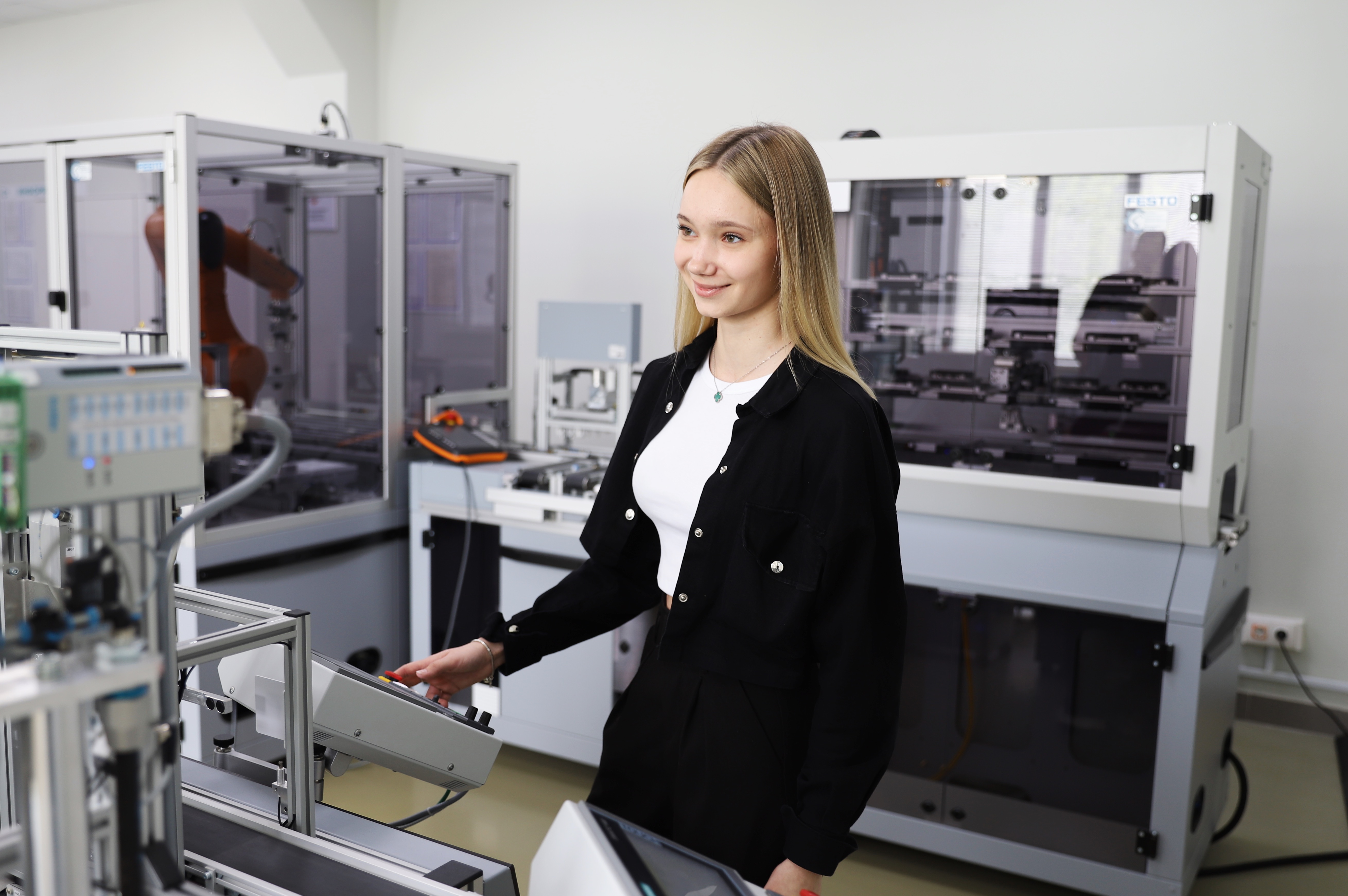
Manufacturing automation is rapidly reshaping the job market, reducing the need for manual labor and placing a stronger emphasis on intellectual and technical tasks.
In Belarus, jobs of the future are already emerging. Among them, mechatronics engineering stands out as highly promising and sought-after by local enterprises. This role integrates skills of control systems programmers, machine operators, mechanical fitters, and electricians, making it a multifaceted position crucial for setting up and maintaining automated systems.
Mechatronics is taught at seven vocational education institutions in the country. The first one to launch a new educational program was the College of Modern Technologies in Mechanical Engineering and Car Service, a branch of the Republican Institute of Vocational Education.
Currently, there are 250 young people studying mechatronics at the College. One of them is Dasha Valevich, a second-year student.

Dasha Valevich took third place at the professional excellence championship in Robotics held in Saint Petersburg, recognized for her digital measurement skills.
For Dasha, the choice of this education path was not an accident. Her father and brother once graduated from the same college, and now she is studying in the same group with her cousin. Nor does she see anything unusual in the fact that she became the only girl in the family dynasty of tech students:
– I have always enjoyed studying blueprints and diagrams, working with equipment. Even as a child, at the datcha, I would often borrow my grandfather's tools and try to figure out how they work. I liked fixing things, assembling and disassembling them.
Dasha tells she never wanted to do the kind an office job dealing with paperwork:
– I enjoy making things with my own hands. I find it creative. Even working with machinery does not feel routine. Each part is unique and needs its own blueprint, a program to run on, and a 3D-model. The entire process is fascinating.

During her time in college, Dasha has never regretted choosing vocational education because she sees prospects for further development:
- Of course, it is hard to predict where I will be in 10 years, but I will definitely work in my field after graduation. Following two years of mandatory employment at a plant, I plan to continue working in manufacturing. Alongside my job, I will pursue higher education to take on more complex tasks and eventually move into leadership roles.

Working at a factory does not frighten the 17-year-old. Dasha believes many of her peers are skeptical about this job due to outdated stereotypes:
– A factory is no different from an office or supermarket; it's just a workspace. Many imagine manufacturing jobs taking place at dirty workshops. But study visits to enterprises and internships have proven me otherwise. Modern factories are equipped with complex, expensive machines. They are clean and tidy.
Dasha shares that working at a manufacturing site has its nuances, such as early shifts and numerous safety regulations but every job has its unique challenges.
"Personally, I am not intimidated by the specifics of factory work. I see opportunities for personal fulfillment and pursuing what genuinely interests me".
Two years into her studies, Dasha has discovered the perks of working in a demanding world of engineering. Rapid technological advancements leave room for the continuous skill enhancement. She also values the opportunity to further her education while gaining practical experience. However, Dasha has also encountered the obstacles women often face in the tech industry:
– When we visited different companies, I was surprised by the fact that some of them don’t hire women for technical jobs. They are okay with women working in logistics or office roles, but not in production. I get this as there is sometimes a need to lift heavy objects. But it still surprised and bummed me out.

Looking ahead, there is a might be a change coming. Automation could reduce the need for physical strength, potentially eliminating one of the main barriers that women face in technical roles.
According to STEM4ALL, only 20.3% of female students in Belarus study engineering, manufacturing, and construction. In Dasha's group of 27, there are eight girls, which is a rare sight in this technical field.
– My friends often ask me why I chose a profession not so typical for women. To which I say: " Who said mechatronics is not for women?" In class, the teachers and classmates treat us girls the same as everyone else. What counts is what you know and can do.


For Dasha, proving her competence is not a must but a personal challenge. In April, she participated in an international competition for Digital Measurements in St. Petersburg, Russia. She operated on an optical measuring system and roundness measuring machine. Before the competition, Dasha has has received hands-on training with special equipment at her college and various companies:
– It was tough, but the experience was worth it. And to top it off, I nailed it on my first try and took home third place.
This spring, UNDP in Belarus released a study on the professions and skills that will be in demand over the next decade. Most will require digital skills and the ability to quickly adapt to new technologies.
Access to quality education and the development of technical and professional skills for young people are crucial for achieving the Sustainable Development Goals. The vocational education system plays a key role in enabling young people to enter the labor market more swiftly. It also helps them to continually enhance their qualifications through on-the-job training.
Creating conditions for youth to acquire in-demand professional skills and competencies in the context of the digital transformation is the main goal of The Developing Youth Innovation Potential for Accelerated Sustainable Development in Belarus project implemented by the United Nations Development Program (UNDP) in Belarus in partnership with the Ministry of Education of the Republic of Belarus and Republican Institute of Professional Education funded by the Russian Federation through the Russian Federation - UNDP Trust Fund for Development.

 Locations
Locations



